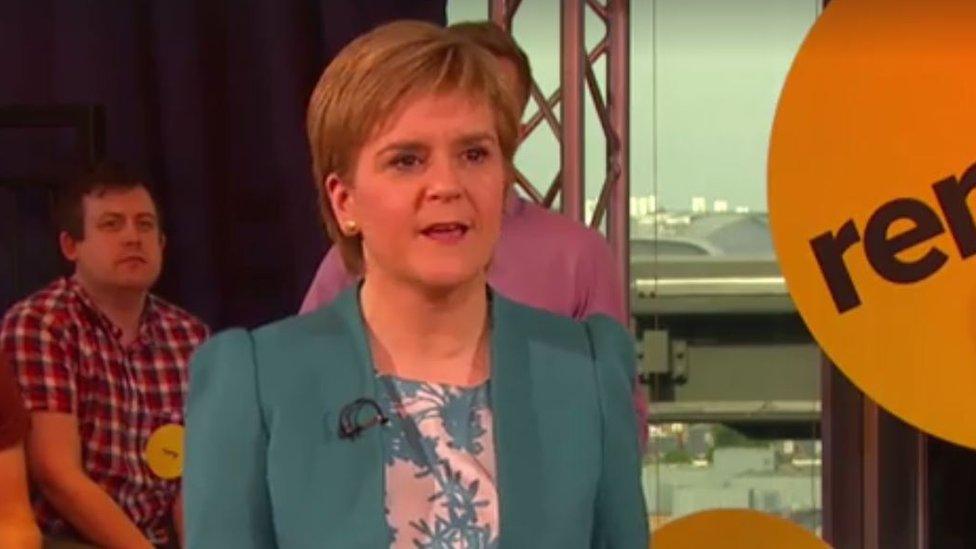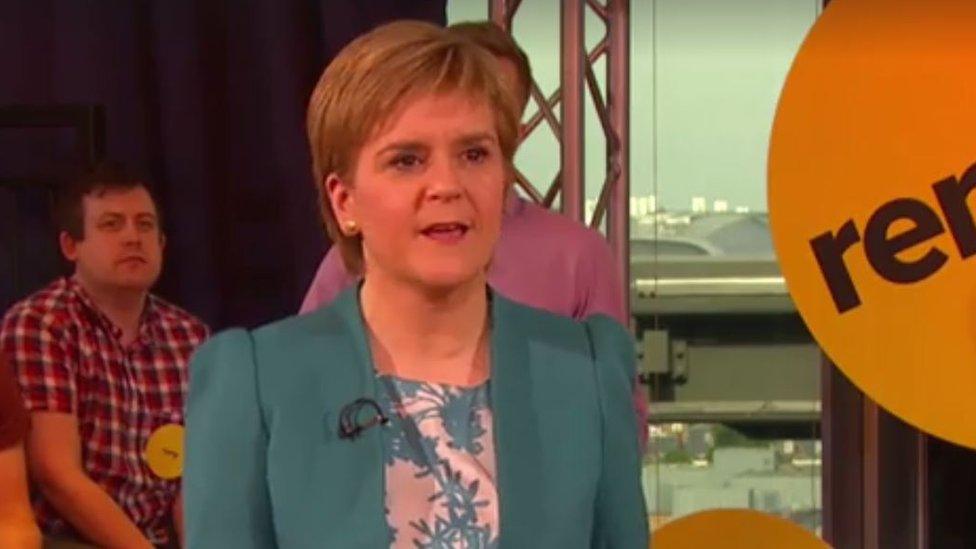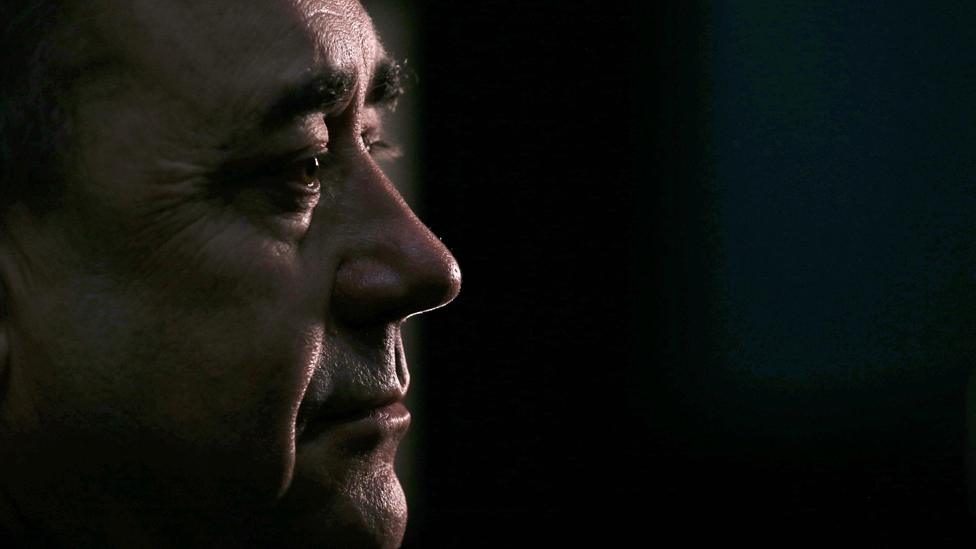Stiglitz: independent Scots currency union plan 'may have been a mistake'
- Published
Prof Joseph Stiglitz tells Good Morning Scotland why he thinks the Euro is a failure
A Nobel prize-winning economist says Scotland's plans for a currency union with the UK during the independence campaign may have been a "mistake".
Joseph Stiglitz is part of First Minster Nicola Sturgeon's council of economic advisors, and advised Alex Salmond when he was in office.
He said Scotland should have looked at proposals for a "Scottish pound" as a transitional measure.
Ms Sturgeon has insisted that "the pound is Scotland's currency".
Mr Salmond, who was first minister at the time of the 2014 referendum, has also called for a fresh look at the currency options for an independent Scotland.
He said the Yes side had been "gazumped" on the issue, although he too said "sterling is the right currency".
The Scottish government is to draw up legislation for a second referendum, with Ms Sturgeon saying such an option is "highly likely" in the wake of the UK's vote to leave the European Union.
'Smoothest transition'
Mr Stiglitz, who has also advised US President Bill Clinton and Labour leader Jeremy Corbyn, won the Nobel prize for economics in 2001 and has recently published a book describing the euro as a threat to the future of Europe.
During the 2014 referendum campaign, the Columbia University professor said a currency union between an independent Scotland and the rest of the UK could work. The plan to share the pound, which then-Chancellor George Osborne said would not be possible, was based on work by the Fiscal Commission Working Group, a sub-set of the council of economic advisors on which Mr Stiglitz served.
However, in an interview with the BBC's Good Morning Scotland programme, Mr Stiglitz said that in hindsight this may have been a "mistake".
He said: "The reason they wanted to link the economy to the pound was that they wanted the smoothest transition possible, they wanted to say we can move from the current economic arrangement while keeping our currency and keeping other institutions.
"I think in hindsight that may have been a mistake. It would be a mistake to join the euro by the way, so what they would have needed to do is perhaps to resurrect the Scottish pound, and let it float.
"Small countries can have their currency. Iceland had one of the deepest downturns in 2008 but had one of the strongest recoveries, because it had its own currency."

Ms Sturgeon was questioned about Scotland's currency during an EU referendum event organised by BuzzFeed and Facebook
Ms Sturgeon and her government are studying Scotland's options for future relations with the EU in the aftermath of the Brexit vote, with possibilities including a second push for independence on the table.
Mr Stiglitz said an independent Scotland adopting its own currency could smooth the path to joining the EU, which normally requires new members to adopt the euro.
He said: "A Scottish pound could be viewed as a transition.
"An important point to realise is that if there were a Scottish pound floating, it could help stimulate the Scottish economy, so the deficit would come down. That would make it acceptable to join the EU.
"I think there's going to be a greater willingness going forward within Europe for countries to be a member of the EU but not have the Euro. Sweden doesn't have the Euro, the UK did not have the Euro, so they have shown a willingness to accept countries into the EU without joining the Euro."

Analysis by BBC Scotland business and economics editor Douglas Fraser
Joseph Stiglitz is one of two Nobel laureates on the Council of Economic Advisers to the Scottish government. Their status was often cited by the Scottish government in 2014 to back the economic case for independence and for a continued currency union with the rest of the UK.
That currency plan was the most intense pressure point from the Better Together campaign.
It is now acknowledged by independence campaigners that it should be re-thought. Even if it was the right policy, it left the campaign exposed.
It was asserted that the UK would have to agree to a currency union, on three hotly contested grounds - with the assertion that sterling was "an asset" belonging to all of the UK, it was seen as being in the UK's economic interests, and because Scotland could refuse to take on a share of UK debt if it did not.
The main Westminster parties stated they would not do such a deal. And they pushed the SNP's independence campaigners to state what their "Plan B" would be.
Now Prof Stiglitz has told BBC Scotland the currency proposal "may have been a mistake" - not on presentational grounds, but on economic ones.

Ms Sturgeon was questioned on the matter during an EU referendum campaign event in London in June.
She said: "The pound is Scotland's currency as much as it is England's currency. That's the currency I think all parts of the UK should use and it's the one I'd want Scotland to use.
"Scotland uses the pound, it's our currency just as it is your currency, and that's the currency I think we should continue to use."
However, SNP MP Joanna Cherry suggested during another EU referendum debate that Scotland might not want to be part of the pound if it sank in value after a Brexit vote.
A spokesman for the SNP said: "Any change in policy on currency would be required to go through the normal party processes - but we agree with Professor Stiglitz that we should not join the euro.
"However our immediate priority is exploring all possible means to protect Scotland's place in Europe, in line with the way people here voted, which is vital for jobs, investment and long-term prosperity."
'Dodgy prospectus'
Opposition parties have spoken out against a second independence poll, with the Scottish Conservatives saying that the best way to boost the economy would be to remove uncertainty for businesses by ruling out another referendum.
Finance spokesman Murdo Fraser said Mr Stiglitz was "the latest in a series of SNP advisors who now see the writing on the wall".
He said: "In the run up to the referendum, Alex Salmond and Nicola Sturgeon promised us the earth, claiming we could have lower taxes, higher spending and keep the pound. It was always utterly unrealistic and now, bit by bit, this dodgy prospectus is falling to pieces.
"There is a simple solution for the SNP on the currency. It's called the UK pound and most people in Scotland would like to keep it. The SNP needs to accept the result of the referendum two years ago and got on with the job of governing."
Scottish Labour leader Kezia Dugdale also said Mr Stiglitz's comments showed the currency union plan was "ill thought out".
She added: "Instead of agitating for a second independence referendum the SNP should focus on the bread and butter issues of government, like getting people back into work and giving everybody a fair chance in life."
Patrick Harvie, whose Scottish Greens backed an independent currency in 2014, said Mr Stiglitz was "right to highlight the dangers of sharing the pound", adding: "If we want the maximum economic control to run a fairer economy, then having our own currency must be a fundamental aim."
Scottish Lib Dem leader Willie Rennie said the SNP would "say anything to win independence, even if it costs jobs and business".
- Published10 June 2016

- Published23 March 2016
